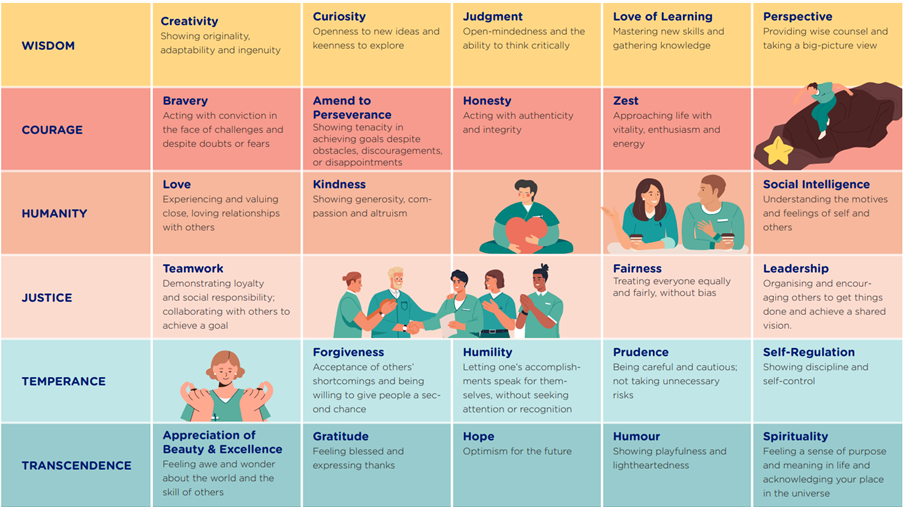As a society, being mindful of our wellbeing has never been more important. This is especially true for those with demanding schedules – such as studying medicine or dentistry.
In light of World Mental Health Day this week, and to support you in prioritising your wellbeing, we’ve enlisted the help of practising dentist and positive psychologist, Mahrukh Khwaja – AKA Mind Ninja.
Not only has she worn the t-shirt, she’s also qualified to understand and apply positive psychology to gain greater wellbeing. In this blog, Mahrukh outlines how understanding and using your strengths can help you thrive while studying.
The importance of avoiding burnout
When we are burnt out as students, we experience deep emotional exhaustion, negative thoughts around our competencies, and a lack of accomplishment.
Feeling engaged at university brings about the opposite set of emotions – we feel energised, absorbed with learning, and dedicated to the mastery of our skills (Schaufeli, 2001).
The amount of pressure associated with studying and workload for medical students, in addition to juggling clinical care, is immense. Anything we can do to make the process easier can really make the time you spend as a student more enjoyable.
One route to increasing this sense of engagement is to double down on our strengths, both with patients and outside of the clinic. In doing so, our levels of positive emotion are raised, moving us into a psychological state of ‘flow’, boosting our engagement and inviting more meaning and resilience into our lives.
Focusing on our strengths makes a lot of sense – it is good for us, our patients, our relationships and the organisations we will work for.
The positive impact of strengths
Studies show that adopting a strengths-based approach is a more effective generator for change. Strengths help us enhance our social relationships, build better coping strategies during challenges, and reduce depressive symptoms (Sin et al. 2009, Linley 2008).
The positive impact of applying character strengths as a medical or dental student aligns with numerous studies on strengths and wellbeing (Govindji and Linley 2007; Littman-Ovadia and Steger 2010; Seligman 2011; Harzer and Ruch 2012, 2013).
Huber et al. 2020 advised promoting self-awareness and character building among medical professionals as an effective strategy for boosting clinician wellbeing, work engagement and improved patient-centred care.
What are strengths?
Strengths refer to the authentic, positive aspects of our personalities that help us shine in life. Understanding what we are good at can help us establish what we stand for and how we can contribute to the greater good.
Even when managing depression, positive psychology interventions report a reduction in symptoms when using strengths on a daily basis (Seligman et al. 2006).
The VIA (Values in Action) Institute of Character is a not-for-profit organisation that was founded in response to research carried out by Seligman and colleagues (Seligman, Park and Peterson, 2004).
The researchers examined strengths across different cultures and countries, collating 24 character strengths with six overall virtues: wisdom, courage, humanity, justice, temperance and transcendence:

The Wellbeing Toolkit for Dental Professionals (Khwaja and Unilever, 2022)
Click here to see full size.
Using strengths as a student
Try this activity to help explore your own strengths (adapted from Resilience and Wellbeing for Dental Professionals, Khwaja, 2023).
- Reflect on your top five strengths and write them down. If you’re stuck for ideas, use the VIA table above and select the strengths that resonate with you the most.
- How are you currently using these strengths with patients and outside of the hospital? Which of your strengths support you the most in doing what you love?
- Strengths can be used to overcome challenges and take positive action to move forward. Which of these strengths have you used to overcome difficulties?
- Think of ways you can activate your strengths and use them in new ways during your week. What might you need to change to make it happen?
- What unexplored strengths would you like to develop?
- What goal could you set that would encourage you to use your strengths more outside of university? What small steps can you take to move forward?
Activating strengths
Leadership
- Lead an activity at university that encourages students who rarely speak to share their opinions
- Reflect on different ways you can improve your leadership style
- Ask your fellow peers for their input
Gratitude
- Reflect on three past challenges you’ve experienced in medical or dental school and three good things they led to
- Think about your best moments of recognition, achievement, praise and connection
- Show gratitude to a peer who makes your day better
Kindness
- Carry out three random acts of kindness per week at university
Love of Learning
- Identify topics on which you can share knowledge with peers
- Arrange a teach-learn date with a friend
Appreciation of beauty
- Notice natural beauty every day by going on a nature walk
- Appreciate a beautiful piece of art or poetry
Spirituality
- Schedule time to meditate
- Sit down, light a candle, and journal
- Read your favourite spiritual text
- Volunteer that a charity that is meaningful for you
- Connect with nature
Your strengths sweet spot
In the same way that strengths can be underused, they can also be overused. Medical and dental students with a high appreciation of beauty and excellence, for example, may find themselves upholding unrealistic standards.
The key is finding your optimal use – that is, the right combination of strengths, to the right degree, and in the right situation. Reflect on the following questions to work out your strengths sweet spot:
- How does it feel when you overuse your top strengths? How does it impact yourself and others?
- What does it feel like when you underuse your strengths? How does it impact yourself and others?
- Consider a recent challenge at university. Which strengths were you underusing, and which were you overusing?
- In situations where you find yourself upset or irritated by others, do you overplay or underplay any of your strengths?
Hitting your strengths sweet spot will help keep you balanced and result in greater satisfaction. So, it’s worth spending a little bit of time discovering your strengths and thinking about how to use them daily for your own and others’ benefit.
References
1. Khwaja, A. (2023). Resilience and Well-being for Dental Professionals, Edition 1. Wiley and Sons Ltd, pp. 207-214.
2. Khwaja, A., Unilever. (2022). The Well-being Toolkit for Dental Professionals.
3. Schaufeli, W. B., Taris, T. W., LeBlanc, P. M., Peeters, M., Bakker, A. B., & De Jonge, J. (2001). Does work make us healthy? In search of the engaged worker. De Psycholoog, 36, pp. 422-428.
4. Harzer, C., & Ruch, W. (2013). The application of signature character strengths and positive experiences at work. Journal of Happiness Studies, 14, pp. 965-983.
5. Govindji, R., & Linley, P. A. (2007). Strengths use, self-concordance and well-being: implications for strengths coaching and coaching psychologists. International Coaching Review, 2, pp. 143-153.
6. Harzer, C., & Ruch, W. (2012). What the job is calling: the role of applying one's signature strengths at work. Journal of Positive Psychology, 7, pp. 362-371.
7. Seligman, M. E., Park, N., & Peterson, C. (2004). The Values In Action (VIA) classification of character strengths. Ricerche di Psicologia.
8. Seligman, M. E. (2011). Flourish: A visionary new understanding of happiness and well-being. New York: Free Press.

